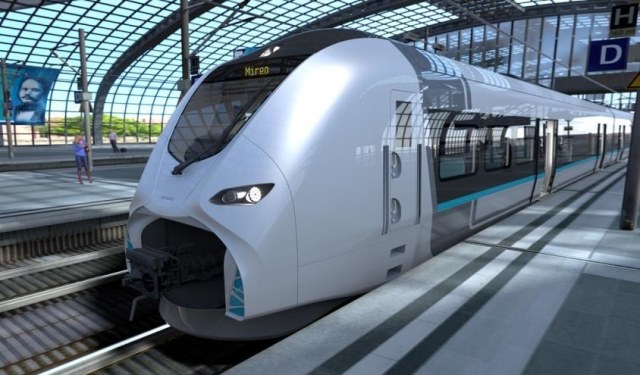
Ballard to design fuel cell engine for new Siemens hydrogen-powered train
by Cleantech Canada Staff

As the hydrogen train market builds momentum, the Vancouver-based fuel cell maker will integrate its technology into a new line of light commuter trains

Siemens introduced the new Mireo regional and commuter transit train last year. PHOTO: Ballard Power Systems Inc.
VANCOUVER—After a long time on the drawing board, the hydrogen train market is finally building up some forward momentum.
Last week French engineering firm Alstom signed a deal to build 14 fuel cell-powered trains for a German rail company. Today, not to be outdone, rail competitor Siemens has taken a step toward entering the hydrail business.
The German industrial conglomerate signed a development agreement with Canadian fuel cell maker Ballard Power Systems Inc. Nov. 14.
The deal, which is worth approximately $9 million, will see Ballard build a 200 kilowatt fuel cell engine that can be integrated into a new light rail train. Siemens said the deal is a step toward replacing the diesel-powered trains currently stalking rail lines around the world with emissions-free vehicles.
Ballard will need to integrate its fuel cell technology into Siemens’ new line of Mireo trains, a modular rail platform the German company introduced last year for regional and commuter transit lines.
Like its Alstom-made counterpart, which uses fuel cells designed by Canada’s Hydrogenics Corp., the train foregoes traditional overhead wires in favour of electric engines powered by hydrogen.
“In this application, fuel cells enable electrification with range, without the need for costly catenary wire infrastructure,” Randy MacEwen, Ballard’s president and CEO, said in a statement.
The new Siemens vehicle is expected to reach speeds of up to 160 kilometers per hour (100 miles per hour) and consume about 25 per cent less energy than diesel trains of the same size, largely due to lighter weight components.
The Munich-based train maker plans to have the new hydrogen-powered train ready for the rails in 2021.